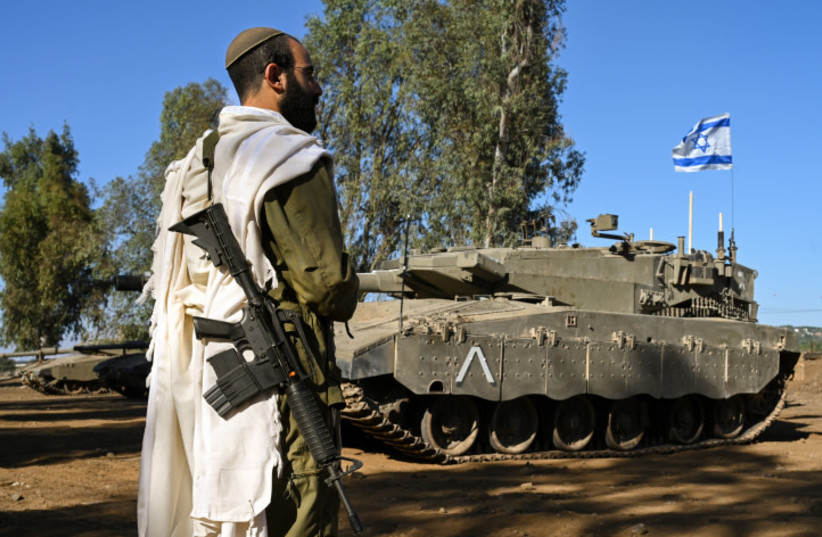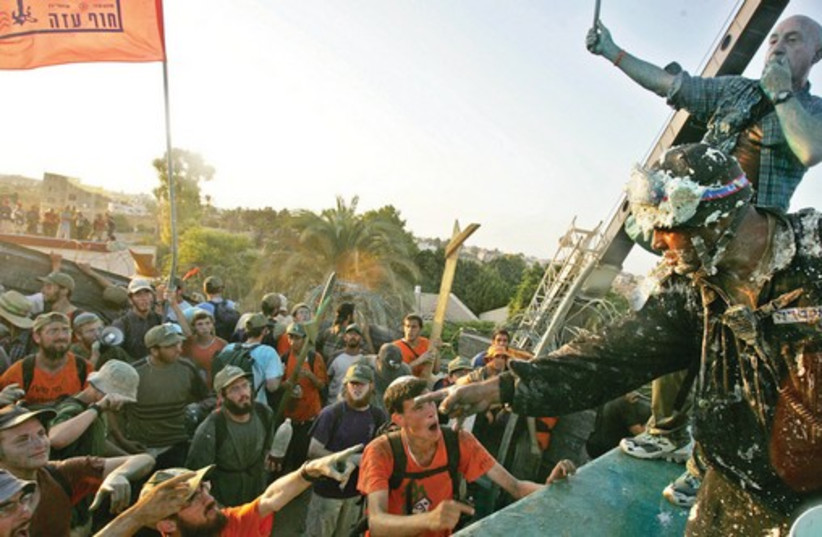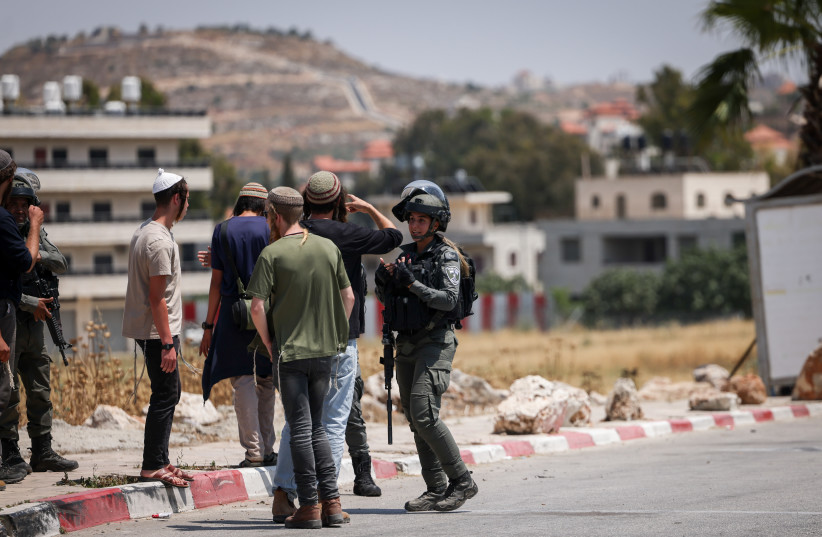Carrying planks of plywood, a group of Israeli settlers pushed past soldiers guarding the barrier surrounding the Gaza Strip and quickly got to work. Within minutes, the young men had erected two small buildings – outposts, they said, of a future Jewish settlement in the war-torn Palestinian enclave.
Their movement had hungered for this moment for years, but now, after October 7, they felt it was just a matter of time before Jews would be living in Gaza again.
“It is ours,” said David Remer, 18. “[God] said it is ours.”
Religious Zionists, who believe the Jewish people have divine authority to rule from the Jordan River to the Mediterranean Sea, make up only around 14% of Israel’s population. But in recent years they have greatly expanded their influence in the military, the government, and society at large, and their often extremist ideology is helping shape Israel’s war against Hamas.
Although they are not politically homogeneous, most religious Zionists embrace far-right views. They loudly oppose a ceasefire deal to bring home Israeli hostages, and have repeatedly blocked humanitarian assistance from entering Gaza by standing in front of aid trucks.

They see the deadly October 7 Hamas-led attack on Israel as proof of their longtime assertion that peace cannot be made with the Palestinians, and view Gaza as a territory that they have a religious obligation to conquer. Increasingly, they have called for the expulsion of the 2.3 million Palestinians living there.
First, they dream of reestablishing Gush Katif, a bloc of Jewish settlements that existed in Gaza until Israel withdrew from the enclave in 2005.
It’s a goal embraced by some of the top leaders in Israel’s far-right government, many of whom appeared at a recent Jerusalem rally pushing for Gaza’s resettlement. While videos played showing Israel’s brutal military assault on the enclave and organizers shared brochures promising new houses with views of the Mediterranean Sea, National Security Minister Itamar Ben-Gvir sang religious songs alongside participants and told them: “Now is the time to return home.”
On the battlefield, some religious soldiers have recorded themselves dancing with Torah scrolls and waving the orange flags of Gush Katif. Other combatants travel with mezuzot to affix to Palestinian homes.
Reuven Gal, former chief psychologist for the military and a researcher at the Technion-Israel Institute of Technology, says that for many soldiers, the Gaza conflict that has killed more than 30,000 Palestinians is “not just a military operation.”
“For them,” he said, “it’s a holy war.”
Yair Margolis, an army reservist who was called up from his yeshiva studies last year to fight in Gaza, said during a recent break from battle that the war had a clear spiritual dimension.
“Going back to that land is returning home,” he said. “This is where we are from, and this is what we are fighting for.”
It’s a vision starkly at odds with Israel’s mainstream, even as the country’s political center has shifted discernibly to the Right in recent years. A January poll by Israel’s Channel 12 broadcaster found that 51% of Israelis opposed building Jewish settlements in Gaza, compared with 38% who supported doing so.
Prime Minister Benjamin Netanyahu has called settling Gaza “unrealistic.” But in 2022, as his ongoing corruption trials left him isolated, Netanyahu made a deal with several religious Zionist parties to form a coalition government, and his political future is now closely tied to theirs.
Beyond a pledge to maintain indefinite military control over Gaza and eventually turn over administrative duties to Palestinians, Netanyahu’s postwar strategy remains murky, leaving a vacuum, political analysts say, that the religious Right is eager to fill.
In a recent video from Gaza circulated on social media, an Israeli soldier dressed in camouflage stands smiling with a machine gun in front of a bombed-out building. He directly addresses Netanyahu.
“We are occupying, deporting, and settling,” the soldier says. “Do you hear that, Bibi?”

The Gaza Disengagement was transformative for religious Zionists
WHILE THE settler movement isn’t composed just of religious people, and over the years it has received backing from both right- and left-wing governments, it is ideologically driven by practitioners of Orthodox Judaism who believe God gave the Land of Israel exclusively to the Jews.
Unlike the ultra-Orthodox, some of whom oppose the Zionist project and decline to serve in the military, religious Zionists embrace the teachings of rabbis who say believers have a spiritual imperative to expand Israel’s borders.
By 2005, around 8,000 mostly religious Zionists were living in Gaza, often in neighborhoods that resembled Southern California subdivisions, with their orderly rows of red-tile-roofed homes. The settlements were heavily guarded by the military, and residents frequently clashed with their Palestinian neighbors.
Amid growing concerns about high casualties among the troops tasked with protecting the settlements, prime minister Ariel Sharon ordered a complete Israeli withdrawal from the enclave. Sharon, who was a supporter of settlers in the West Bank, now instructed soldiers to forcibly remove them from Gaza.
The Disengagement from Gaza, with its scenes of screaming settlers being pulled from their homes and synagogues, was transformative for religious Zionists. Many vowed to gain more influence in the traditionally secular institutions they felt had betrayed them.
“For them it was a traumatic event,” said Yagil Levy, a professor of political sociology at the Open University. “They want to erase this trauma by any means.”
That meant building a political movement that has sought “to push the government as far Right as it can go” and “completely demolish any talk of a Palestinian state,” said political scientist Dahlia Scheindlin. Over time, she said, ideas that once seemed extreme – like expanding settlements in the West Bank – became normalized.
Helping their cause were the country’s changing demographics: Religious Zionists, like the ultra-Orthodox, were having children at a much higher rate than their secular peers.
At the same time, they were making new inroads in the army.
The military academy that has become the West Point for the religious Right is built atop a wind-swept hill in the West Bank settlement of Eli. Here, young men wearing yarmulkes spend their days studying both the Torah and military strategy.
For many years, religious Zionist families were hesitant for their sons to fulfill the mandatory three-year army service, worried that exposure to secular peers would erode their faith. This school, Bnei David, promised to minimize that risk, offering teenage boys a chance to fortify their religious beliefs before entering the military. Its website boasts of starting a “quiet revolution in the Israel Defense Forces.”
Students are taught that God “wants a people of Israel, and there is no State of Israel if there isn’t a strong army,” said Rabbi Eli Sadan, the school’s founder. They’re also taught by instructors who oppose the presence of women in the military and who have described gay people as “sick and perverted.”
Speaking from behind a large desk strewn with rabbinical texts, Sadan said he supports a scorched-earth military strategy in Gaza, “so Israel’s enemies will see the ruins and think: I don’t want to mess with the Jews.”
He is against the rebuilding of Palestinian society in Gaza, where at least half of all buildings have been damaged or destroyed during Israel’s fierce bombing campaign.
“We must eliminate the possibility of Gazans returning,” he said, arguing that displaced civilians should be forced to live in tents for many years until they decide “to emigrate willingly.”
Sadan said his school, which recently hosted events with both Netanyahu and Israel’s defense minister, has produced 3,000 soldiers, more than 50% of whom have risen to the rank of officer or higher. Since the conflict broke out, 18 alumni have died in Gaza.
The rise of religious military academies like this one has dramatically changed the makeup of the army, said Levy, the sociologist. Religious Zionists made up about 3% of officer school graduates in 1990, Levy’s research shows; in 2018, they accounted for over a third.
Levy, who has written about what he calls the “theocratization of the Israeli military,” said the trend has caused conflicts, with some religious soldiers refusing to serve alongside women.
A pressing question, he said, is whether religious soldiers would comply with orders to forcibly remove Jewish residents from a settlement – a scenario that could play out under the creation of a Palestinian state.
Sadan said he teaches his students to always heed commands from military superiors. But during the 2005 Disengagement from Gaza, other rabbis called on soldiers to refuse orders, and some did.
“What we see is growing resistance in the ranks,” Levy said. “They’re trying to challenge the formal codes of the military.”

Would-be Gaza settlers model their plan on the West Bank
THOSE HOPING to establish Jewish settlements in Gaza say they will model their strategy on the West Bank, where today 500,000 settlers live among three million Palestinians.
Since October 7, tensions there have been simmering as the line between settlers and soldiers has become increasingly blurred.
After the Hamas attack in southern Israel killed around 1,200 civilians, hundreds of thousands of Israeli reservists were called up for duty. Many reservists in the West Bank were instructed to don uniforms and guard their own communities.
Among them were Yosef Shalom Sheinman, 30, who is from Har Bracha, a mountain settlement overlooking the Palestinian city of Nablus.
Sheinman’s parents helped found Har Bracha in 1987 amid protests from Jewish leftists and the Palestinians who once grazed sheep here. His younger brother, 27-year-old Yishai, belongs to a famously violent extremist group known as the hilltop youth, which is devoted to expanding Israeli control of the region.
“These are kids who would eat Arabs for breakfast,” their father says proudly.
For decades, Israeli soldiers have been deployed throughout the West Bank to protect existing settlements, which most of the world considers illegal under international law. But the soldiers are also often instructed to stop the building of illegal settlement outposts. In the past, they sometimes clashed with Yishai Sheinman, tearing down new outposts he and his friends had erected.
Now many of the soldiers in the region are his friends – or, in the case of his older brother, his family.
The reservists are not curtailing settlement expansion, the older brother said. Instead, they’re focused on patrolling nearby Palestinian villages – and making sure they aren’t growing. His unit recently cut a new road through a stretch of hillside between a Palestinian hamlet and Har Bracha, in effect claiming the area for the settlement.
“This is our land,” he said. “And God is with us.”
On a recent afternoon, Sheinman stood with his father, Avraham, taking in views sweeping from the peaks of Jordan to the skyscrapers of Tel Aviv. Avraham Sheinman clutched a well-worn Torah, which he consulted frequently to highlight passages that he says show Jews have a religious obligation to be here. “We have a commandment to conquer it,” he said.
He spoke of a war with Palestinians, but also of “an inner war” within Israel.
“Who are we? What direction are we going?” he asked. “Are we going in the direction of our destiny as a chosen people in the Land of Israel – as a Jewish state according to Jewish law? Or are we a secular leftist copy of Europe or America?”
Many on the other side of the political divide view that question with the same urgency.
In an interview with Sky News this month, writer and historian Yuval Noah Harari said the biggest threat to Israel is not Hamas, Hezbollah, or Iran, but Jewish extremism: “There is really a battle for the soul of the Israeli nation between patriotism on the one side and ideals of Jewish supremacy on the other.”
